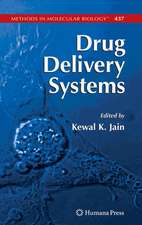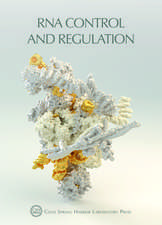Immobilization of Enzymes and Cells: Methods in Biotechnology, cartea 22
Editat de José M. Guisánen Limba Engleză Paperback – 19 noi 2010
| Toate formatele și edițiile | Preț | Express |
|---|---|---|
| Paperback (1) | 953.52 lei 6-8 săpt. | |
| Humana Press Inc. – 19 noi 2010 | 953.52 lei 6-8 săpt. | |
| Hardback (1) | 959.82 lei 6-8 săpt. | |
| Humana Press Inc. – 15 mar 2006 | 959.82 lei 6-8 săpt. |
Din seria Methods in Biotechnology
- 15%
 Preț: 648.74 lei
Preț: 648.74 lei - 15%
 Preț: 656.43 lei
Preț: 656.43 lei - 15%
 Preț: 650.69 lei
Preț: 650.69 lei - 15%
 Preț: 639.90 lei
Preț: 639.90 lei - 18%
 Preț: 953.52 lei
Preț: 953.52 lei - 18%
 Preț: 969.93 lei
Preț: 969.93 lei - 18%
 Preț: 954.14 lei
Preț: 954.14 lei - 18%
 Preț: 952.57 lei
Preț: 952.57 lei - 18%
 Preț: 963.15 lei
Preț: 963.15 lei - 18%
 Preț: 961.23 lei
Preț: 961.23 lei - 15%
 Preț: 652.31 lei
Preț: 652.31 lei - 15%
 Preț: 651.19 lei
Preț: 651.19 lei - 18%
 Preț: 962.35 lei
Preț: 962.35 lei - 18%
 Preț: 955.56 lei
Preț: 955.56 lei - 15%
 Preț: 649.87 lei
Preț: 649.87 lei - 18%
 Preț: 964.71 lei
Preț: 964.71 lei - 15%
 Preț: 648.05 lei
Preț: 648.05 lei - 15%
 Preț: 632.66 lei
Preț: 632.66 lei - 15%
 Preț: 643.99 lei
Preț: 643.99 lei
Preț: 953.52 lei
Preț vechi: 1162.82 lei
-18% Nou
Puncte Express: 1430
Preț estimativ în valută:
182.48€ • 198.14$ • 153.28£
182.48€ • 198.14$ • 153.28£
Carte tipărită la comandă
Livrare economică 22 aprilie-06 mai
Preluare comenzi: 021 569.72.76
Specificații
ISBN-13: 9781617374739
ISBN-10: 1617374733
Pagini: 450
Ilustrații: XIV, 450 p. 217 illus.
Dimensiuni: 152 x 229 x 26 mm
Greutate: 0.68 kg
Ediția:Softcover reprint of hardcover 2nd ed. 2006
Editura: Humana Press Inc.
Colecția Humana
Seria Methods in Biotechnology
Locul publicării:Totowa, NJ, United States
ISBN-10: 1617374733
Pagini: 450
Ilustrații: XIV, 450 p. 217 illus.
Dimensiuni: 152 x 229 x 26 mm
Greutate: 0.68 kg
Ediția:Softcover reprint of hardcover 2nd ed. 2006
Editura: Humana Press Inc.
Colecția Humana
Seria Methods in Biotechnology
Locul publicării:Totowa, NJ, United States
Public țintă
ResearchCuprins
Immobilization of Enzymes as the 21st Century Begins.- Immobilization of Enzymes.- Cross-Linked Enzyme Aggregates.- Immobilization-Stabilization of Enzymes by Multipoint Covalent Attachment on Supports Activated With Epoxy Groups.- Glutaraldehyde in Protein Immobilization.- Practical Protocols for Lipase Immobilization Via Sol-Gel Techniques.- Encapsulation of Enzymes Using Polymers and Sol-Gel Techniques.- Design of Smart Biocatalysts.- Affinity Immobilization of Tagged Enzymes.- Bioaffinity Immobilization.- One-Step Purification, Immobilization, and Stabilization of Poly-Histidine-Tagged Enzymes Using Metal Chelate-Epoxy Supports.- Stabilization of Multimeric Enzymes Via Immobilization and Further Cross-Linking With Aldehyde-Dextran.- Purification, Immobilization, Hyperactivation, and Stabilization of Lipases by Selective Adsorption on Hydrophobic Supports.- Immobilization and Stabilization of Proteins by Multipoint Covalent Attachment on Novel Amino-Epoxy-Sepabeads®.- Improved Stabilization of Chemically Aminated Enzymes Via Multipoint Covalent Attachment on Glyoxyl Supports.- Stabilization of New Imprint Property of Glucose Oxidase in Pure Aqueous Medium by Cross-Linked-Imprinting Approach.- Reversible Covalent Immobilization of Enzymes Via Their Thiol Groups.- Very Strong But Reversible Immobilization of Enzymes on Supports Coated With Ionic Polymers.- Immobilization of Enzymes on Magnetic Particles.- Immobilization of Proteins on Gold Surfaces.- Immobilization of Enzymes on Electrodes.- Immobilization of Enzymes for Use in Organic Media.- Immobilization of Enzymes for Use in Ionic Liquids.- Immobilization of Enzymes for Use in Supercritical Fluids.- Immobilized Enzymes for Biomedical Applications.- Characterization of Immobilized Enzymes by Microcalorimetry.- Useof Immobilized Biocatalysts in Fluidized Bed Format.- Taylor-Couette Vortex Flow in Enzymatic Reactors.- A Novel Immobilization Method for Entrapment: LentiKats®.- Encapsulation of Cells in Alginate Gels.- Immobilization of Cells on Polyurethane Foam.- Immobilization of Cells With Transition Metal.- Immobilization of Microalgae.- Bioluminescence in Immobilized Cells for Biomass Detection and Biosensor Applications.- A Proteomic Approach to Biofilm Cell Physiology.- Encapsulation of Bacteria for Biodegradation of Gasoline Hydrocarbons.- Biomedical Applications of Immobilized Cells.
Recenzii
"Many well-known authors from research laboratories worldwide have contributed to this successful volume. . .this book provides a basic reference tool for all those who will need to immobilize biological materials in their work-not only for the beginner in the field, but also for experienced researchers."-Applied Biochemistry and Biotechnology
From Reviews of the First Edition...
"...enables researchers to rapidly enter the world of immobilization...an excellent reference work that will have long lasting value." -Quarterly Review of Biology
"...one of the most comprehensive collections of immobilization methodologies...[will] find extensive use as a methodology/reference text in any biotechnology-based laboratory." -Microbiology Today
"...a valuable tool for researchers in the many areas requiring enzyme and cell immobilizations." - Trends in Biotechnology
"...an ideal reference book to have around the laboratory." -Trends in Cell Biology
"...a worthwhile addition to any research library...especially useful for anyone involved in preparative isolations or needing immobilized reagents for specific research applications." -Doody's Health Sciences Book Review Journal
"...the coverage of the various techniques is excellent..." -The Analyst
From Reviews of the First Edition...
"...enables researchers to rapidly enter the world of immobilization...an excellent reference work that will have long lasting value." -Quarterly Review of Biology
"...one of the most comprehensive collections of immobilization methodologies...[will] find extensive use as a methodology/reference text in any biotechnology-based laboratory." -Microbiology Today
"...a valuable tool for researchers in the many areas requiring enzyme and cell immobilizations." - Trends in Biotechnology
"...an ideal reference book to have around the laboratory." -Trends in Cell Biology
"...a worthwhile addition to any research library...especially useful for anyone involved in preparative isolations or needing immobilized reagents for specific research applications." -Doody's Health Sciences Book Review Journal
"...the coverage of the various techniques is excellent..." -The Analyst
Textul de pe ultima copertă
The continuing rapid progress in work designed to improve the functional properties of enzymes and cells as industrial catalysts has led to this revised, updated, and expanded new edition of the warmly received initial edition of Immobilization of Enzymes and Cells. This long-awaited second edition contains new and simplified protocols useful for industrial applications, novel techniques that will prove useful now or in the near future, and protocols for the preparation of immobilized derivatives suitable for a wide variety of nonconventional reaction media. The authors also offer tools for the development of new immobilization techniques, methods for preparing immobilized derivatives for therapeutic and industrial use, and new chemical reactors designed to overcome the limitations of immobilized derivatives. The emphasis is on improving enzyme and cell properties via very simple immobilization protocols, along with the development of new and better methods. The protocols follow the successful Methods in Biotechnology™ series format, each offering step-by-step laboratory instructions, an introduction outlining the principles behind the technique, lists of the necessary equipment and reagents, and tips on troubleshooting and avoiding known pitfalls.
Innovative and highly practical, Immobilization of Enzymes and Cells, Second Edition, affords biochemists, biotechnologists, and biochemical engineers a practical review of all the latest methods and tools-as well as optimized conventional techniques-needed to carry out successful research involving immobilizing enzymes and cells.
Innovative and highly practical, Immobilization of Enzymes and Cells, Second Edition, affords biochemists, biotechnologists, and biochemical engineers a practical review of all the latest methods and tools-as well as optimized conventional techniques-needed to carry out successful research involving immobilizing enzymes and cells.
Caracteristici
Includes supplementary material: sn.pub/extras





















